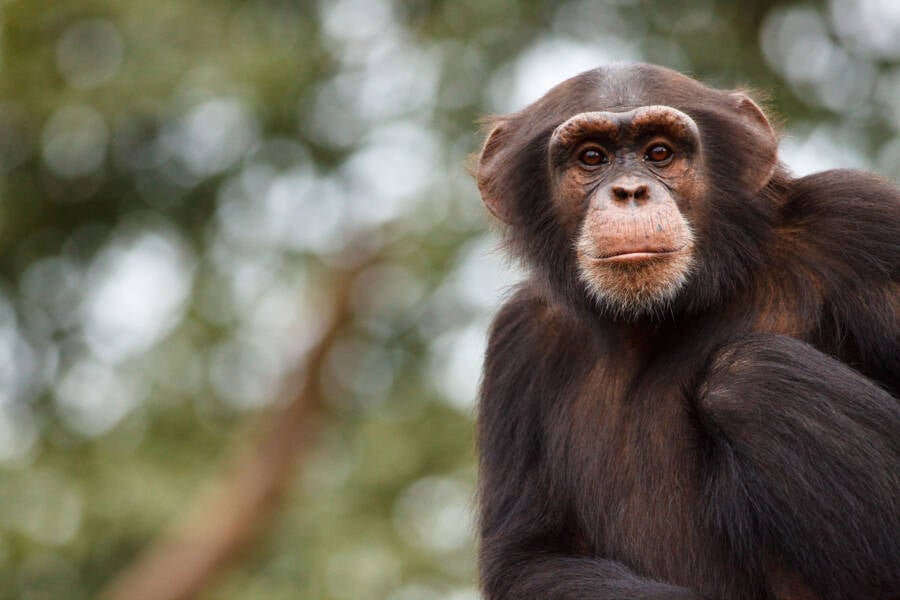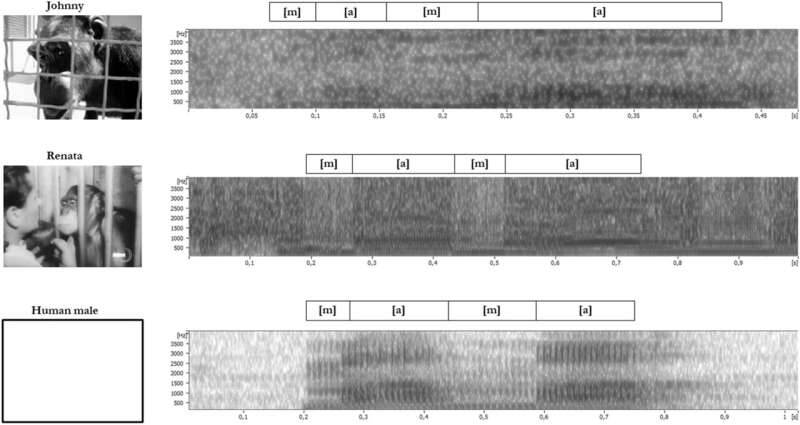A study examining videos of chimpanzees saying words like "mama" and "cup" has revealed that humankind's closest ancestor may be more capable of speech than originally believed.

Nick Ledger / Alamy Stock PhotoA chimpanzee at Tacugama Chimpanzee Sanctuary in Sierra Leone.
It has been widely accepted that language is unique to humankind. Of all the animals on Earth, humans possess a unique ability to not only form distinct words to convey meaning but also apply those words in social situations and change their connotations within different contexts.
Now, researchers examining videos of chimpanzees speaking human words have challenged this belief. A new study is demonstrating how chimps are far more capable of speech than originally believed.
With further research, this revelation could redefine our understanding of both human language evolution and great ape speech capability.
Inside Humankind’s Unique Speech Ability
Today, experts are still unsure when human language developed. Estimates range from 300,000 years ago to as recently as 50,000 years ago. However, it is widely accepted that humans are the only animals with phonetic ability and the capacity to learn new vocalizations.
For years, researchers have attempted to experiment with language in other animals, including sperm whales, which communicate with a complicated “alphabet” consisting of rapid clicks.
The most fruitful experimentation has occurred among humans’ closest relatives, the great apes. Perhaps the most famous example is Koko, the gorilla who was taught to use sign language. In an experiment in 2023, researchers discovered that chimpanzees use syntax and specific sounds to convey unique ideas about their environment.

Axel G. Ekström et al./Scientific ReportsComparative speech patterns between two chimps and a human male.
However, scientists have emphasized that, aside from humans, no known animal communicates with “language” in the wild. Instead, animals interact with unique sounds, gestures, and other visual displays. These interactions are often highly emotional and innate, making them less of a developed language but rather a system of codes that they aren’t necessarily able to modify in different social contexts.
Because of this, researchers long believed that apes lacked the necessary neurological skills or physical control of their vocal cords that would be necessary for developing language.
As humans’ closest relatives, chimpanzees have shown the most promise for researchers looking to understand the evolution of language. A recent study from speech specialists and psychologists from Sweden, the United Kingdom, and Switzerland has now revealed for the first time that chimps may indeed be able to communicate like humans.
Old Videos Of Chimpanzees Speaking Shock Researchers
Recently, a team of researchers led by Axel G. Ekström wanted to dive into the question of whether our closest relative is capable of developing language.
The team started by examining three videos of chimpanzees in captivity appearing to speak words to their caretakers. Researchers discovered these videos after scouring the internet
“Sometimes, videos that are recorded for fun by the general public turn out to be of huge interest to researchers,” Ekström told All That’s Interesting in an email.
The first video was of a chimpanzee named Renata working with her caretaker in Italy in 1962. In the video, Renata is recorded speaking the word “mama” whenever her trainer touches her on the chin.
The second video showed Johnny, a chimpanzee from the Suncoast Primate Sanctuary in Palm Harbor, Florida, in the mid-2000s. In the clip, Johnny calls out “mama” when enticed with a red Twizzler.
Using audio from the clips, researchers compared the speech phonetics of the two chimps with a human male, resulting in the conclusion that chimpanzees are capable of producing the syllable structure necessary to speak a language.
But the researchers didn’t just stop there. According to the study, scientists had participants transcribe vocalizations from both the chimpanzees and patients with Parkinson’s disease, an illness often accompanied by speech disturbances. Participants weren’t told which speaker they were listening to in each clip. Results found that the participants consistently recorded the chimpanzee speech as expressing the word “mama.”
This study demonstrates the severe underestimation of chimp speech capabilities and sheds light on how humans evolved to develop language.
Researchers argue that a common ancestor between humans and great apes had these speech capabilities, and that both chimpanzees and humans maintain them. It also challenges the long-held belief that language development required an evolution in brain function among humans that chimps and other great apes did not experience.
“Great ape vocal production capacities have been underestimated,” researchers explained. “Chimpanzees possess the neural building blocks necessary for speech. Our data complements this picture: chimpanzees can produce the putative ‘first words’ of spoken languages.”
Now, Ekström and his team are working on a series of projects studying the vocal behaviors of chimpanzees, gorillas, and orangutans.
“There is good data from human languages that the anatomy of the vocal tract itself helps shape the sounds of languages, and I suspect something similar is going on in our closest relatives – who are all very good communicators,” Ekström told All That’s Interesting.
After reading about the latest study on chimpanzee speech, dive into the story of Travis the Chimp and his gruesome attack on Charla Nash. Then, read about Ham the Chimp, the first chimpanzee to survive spaceflight.





